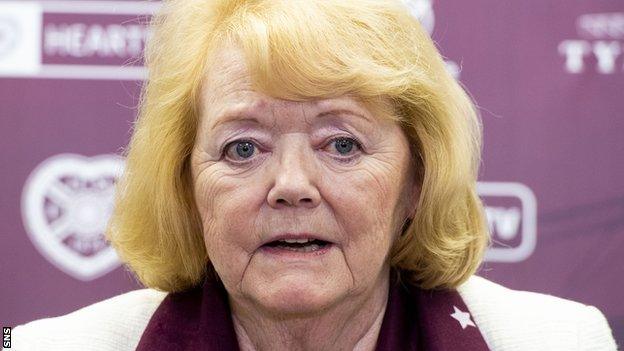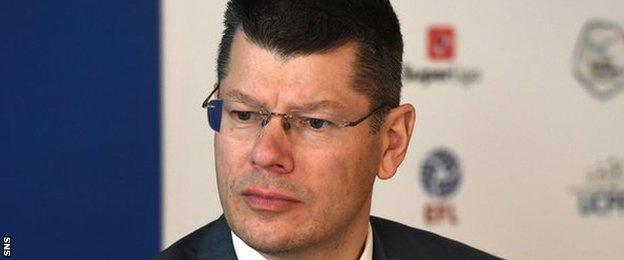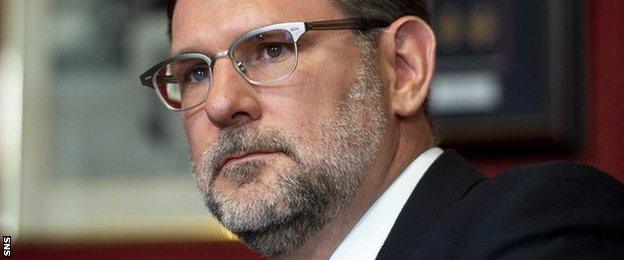Hearts: Owner Ann Budge reflects on turbulent week for Scottish football
- Published

Ann Budge says an independent inquiry into the SPFL's recent actions is "essential"
When Ann Budge says that this past week has been the most traumatic in her six years running Hearts you get a sense of what's been going on in the spectacular odditorium that is Scottish football.
Budge would probably not be the only chairman or chief executive who'd single out the last seven days as the time when the domestic game, forever teetering on the edge of bonkerdom, finally tipped itself into full-blown circus act.
This interview touches on what has already happened and what might happen yet, on Rangers' call for an independent inquiry into the performance of the SPFL board, on John Nelms at Dundee and his strange U-turn, on league reconstruction and the need for speed.
"Distressing is not too strong a word," she says, when summarising the twists and turns since last Friday.
Tom English: Rangers have alleged bullying and coercion regarding the SPFL board, do you agree with them?
Ann Budge: I can't really agree with the bullying allegation because I was not party to it. I'm guessing that Rangers were similarly not party to it but, like me, they will have heard a lot of stories. In terms of coercion, the whole style in which the SPFL's resolution was written lends itself to that claim. Tying the resolution to paying out money and so on. Anything to do with bullying is hearsay as far as I'm concerned. I have no evidence of it.
TE: Your statement the other day said you were "disillusioned and bitterly disappointed... the whole process has been incredibly badly handled and shows Scottish football in a very poor light." Have you any faith in the SPFL board right now?
AB: Again, that's a really difficult question to answer. I sat on the board for a couple of seasons and I know how difficult these things are. That said, I think they made some very poor decisions. I also think that having realised that they maybe misjudged this, they could have said: 'Actually, we got a couple of things wrong here'. But that's not common in Scottish football, people don't generally hold their hands up and say: 'Oh, we got this wrong'. Do I have faith in the board? I feel for the board members because I know how difficult it is. I think they're all trying to do the best they can. Some of them have been as upset by this as everyone else has.
Ann Budge says the right thing for the SPFL to do is call a review
TE: Rangers have called for an independent inquiry, do you support them on that?
AB: I do. I think there's been so much negativity and it has reached such a height that without an independent review it's not ever going to to go away. People will be talking about it for a long time to come. It would be the right thing to do.
TE: That's an independent review and not an internal view, as seems to be the SPFL's choice...
AB: I've already heard clubs saying that [an internal review] is like marking your own homework. I don't think it would carry the same weight, An independent review would satisfy everybody. At least people would at least know that this has been looked at, that problems have been highlighted and maybe, just maybe, we won't make the same mistakes again in the future. I can't see a downside.
TE: Rangers have also called for the suspension of [SPL chief executive] Neil Doncaster and SPFL lawyer Rod McKenzie, would you go that far?
AB: If they go with the independent review then it's not needed. You don't need to go down that route if there's an agreement to an independent review. There are practical issues [if you suspend Doncaster]. Who' s going to run things? Rangers have said they have evidence of certain things. If they have evidence, then that's a different thing entirely. I don't have evidence.
TE: It has been decided by the 42 clubs, though. The resolution had more than 80% backing, That's democracy at work, isn't it?

Rangers have called for SPL chief executive Neil Doncaster to be suspended
AB: Tying the resolution to the release of money put undue pressure on clubs. Why it had to be that way has still has not been answered to my satisfaction because I genuinely believe there were other ways to release those funds. I don't believe there's a club in the country that wouldn't say: 'Yes, let's give the board the authority to release the funds now before we go any further'. Linking the release of funds to accepting the resolution did influence the outcome.
TE: But Neil Doncaster has said repeatedly that there is no other way, that by the rules of the league, the money could only be released once final league placing were known. Partick Thistle's QC has had a look at the rules and he disagrees. Who's right?
AB: I've sat on the SPFL board and I've approved a loan for another club. I know that loans can be approved.
TE: When was that?
AB: In my early days as a director. I genuinely can't remember the club involved, but a club required an advance. We discussed it [as a board], it wasn't contentious, everybody agreed and we moved on. It sticks in my mind. Can you give a loan to a club? Yes you can. And I know that for a fact.
TE: What is Scottish football to make of a loan being approved in the past and the SPFL saying a loan could not be made now?
AB: I don't believe that question has been answered. It's one of the reasons why I would back calls for an independent review because I would like to know exactly what the problem was. It might be to do with the quantum of loans, the duty of directors to protect the company, it could be wrapped up in that. But it's happened in the past and it could have been done.
TE: The SPFL released their statement confirming the resolution had passed. I thought they would have shown some contrition and humility for the chaos but there wasn't a shred of that...
AB: I would be agreeing with you on that one. It comes back to how things have been handled. They've been handled badly.
TE: You're on the reconstruction task force. Tell me, is a task force more serious than a working party? What's the hierarchy of these things?
AB: I think a working party sounds like it might take some time whereas a task force is meant to imply that we can get things done very quickly. That's my interpretation of it. I asked the SPFL if I could see the objections the last time this [reconstruction] was looked at because I don't want to start with a blank piece of paper. I want to know what the objections were so we can start addressing these objections in case they still apply. I didn't want to get into a situation where we're wasting time. As a consequence of that phone call I was asked if I would join forces with the SPFL, which I opted to do, on the understanding that I was looking for a temporary resolution to a unique situation. I didn't want to get involved in months-long discussions trying to solve a problem that people haven't been able to solve for years.
TE: You want a quick fix?
AB; I do, to reflect a completely abnormal situation. Let's put something in place that will address that instead of trying to find a solution to a problem that many people have been looking at for 10 years. I don't want to go there.
TE: The optics of this are Hearts, bottom of the league and facing relegation, might be dug out of danger by the head of the task force, who happens to be the chair of Hearts. Is this not another example of Scottish football's self-interest and self-preservation?
AB: It's about righting some wrongs that have been done and I don't think it matters who leads it. The important thing is that it needs to be driven quickly. We need a quick decision, we need clarity, we need to talk to every single club and try to ensure that their concerns are heard and speed is of the essence.
TE: We spoke in 2016 and your view at that time was that there were too many senior clubs in Scotland. You said 42 was too many and that half that number would be about right. Now you're overseeing reconstruction which may lead to that number increasing and not decreasing...
AB: I do recognise the irony of the situation. What I'm proposing comes back to fairness. It's a one-off situation. I've been assured by so many people that they think relegation in this situation is unfair. I've heard it from board members, I've heard it from many other clubs. Partick Thistle, it's astonishing that they should find themselves relegated. There is a genuine recognition that this isn't right.
TE: It's your intention to speak to every club?
AB: Les Gray [of Hamilton, who is also heading up the task force] and I have discussed ways forward. I want to speak to every one of the 42 clubs to ensure that they have a voice.
TE: Including Dundee?
AB: Including Dundee. This is all going to a vote and we need as many clubs as possible on side.
TE: Would you say your conversations with [Dundee managing director] John Nelms, last Friday, is still troubling you?
AB: It does trouble me. After we spoke last Friday night I had a message relayed to me from John, via a third party. He apologised.

Ann Budge says she received an apology from Dundee's managing director John Nelms
TE: Apologised for what?
AB: I don't know, It was simply a message to say: 'Tell Ann, I'm sorry'.
TE: The 'Tell Ann, I'm sorry' message was to somebody else?
AB: Yes.
TE: Why couldn't he tell you himself? Why not go straight to you?
AB: I don't know. I genuinely don't know. He was speaking to this other individual and it came up.
TE: What was the chronology of this?
AB: We had a conversation in the middle of last Friday afternoon, around 3.30pm or 4pm, The reason for the call was about the next steps. John and myself were firmly convinced that the resolution was going to be voted down and he wanted to talk to me about submitting a different resolution and he was asking me for input on his resolution which he subsequently sent to me. I received it at 5:03pm on Friday.
TE: And during that conversation there was no sense that he was anything other than a No voter?
AB: Absolutely none.
TE: Do you have any clarity on what happened for a no vote to get turned into a yes vote?
AB: I have absolutely no idea. I got the message saying sorry on Friday evening. On the Saturday I phoned and left a voicemail, I did the same, if I remember rightly on the Sunday, and I certainly did it again on the Monday. I tried to speak to him to find out what was going on, but at this point he was involved in whatever he was involved in. I just found it extraordinary behaviour, to be honest. I have no insight into what was in John's mind. I haven't spoken to him, but we exchanged a text earlier in the week where he indicated to me, because of everything that happened over the weekend, he didn't feel he could discuss things. That was before he cast his vote [on Wednesday].
TE: Can you understand the scepticism of football fans looking in from the outside? How can consensus on reconstruction be found if some clubs just do their own thing?
AB: Sadly, there's been lots of evidence that self-interest does play a part and I can understand it because it's a very tough business to be in. I can understand why it happens, but clubs need to pull together to ensure we all survive. None of us have a clue how long this is going to go on for. Various clubs have different pressures, but we are all under pressure, without exception. The usual attitude of self-interest should be put to one side and we need to be saying what's best for all of Scottish football. Do I have doubts about it happening? I do, I'm afraid. I have doubts, but if we can move quickly enough and transparently enough and give everybody a say, and avoid some of the mistakes made previously, then we have a fighting chance.
TE: What's the timeframe?
AB: Given that we now have this task force we have to have an initial discussion, document key issues and then quickly put together one or two - I'd like to think no more than two - options. Then we need to speak to every single club and explain the position so there is absolute clarity about what is being proposed. I believe we would then have to put the resolution to the board, the board would have to approve it, hopefully back it, and send it out as as a resolution for the 42 to vote on. I would like to see that happening very, very quickly. A couple of weeks. Other people are saying the end of May. I think the end of May is too long, but I might be proved wrong there. I want it done as quickly as possible. Two or three weeks maximum.
TE: It's been a grim week...
AB: The thing that upsets me is that this could have been avoided, by talking, by being open. I don't think we needed to go through any of this. That's one of the saddest things about it.
TE: Which brings us back to an independent review...
AB: Yes, it does. We need to try to draw line under it and if we don't have an independent inquiry then I don't think a line will ever be drawn under it. I think it's essential.